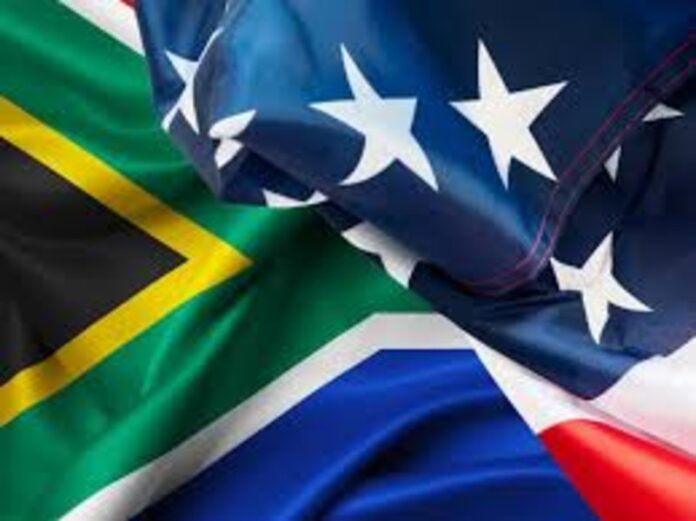The United States government has announced a 30% “reciprocal” tariff on all South African exports, which would take effect on August 1, 2025, and could drastically alter the country’s economic and investment environment. The decision poses a material threat to key sectors including agriculture, automotive components, mining, and value-added manufacturing, potentially derailing South Africa’s post-pandemic economic recovery and investor confidence.
U.S. Tariffs Threaten South Africa’s Agricultural and Industrial Exports
Democratic Alliance (DA) Leader and Minister of Agriculture John Steenhuisen claims that South Africa’s agricultural exports increased by 10% year over year to US$3.36 billion in Q1 2025.
The recently imposed tariffs, however, have the potential to seriously undermine this growth trajectory. Up to 35,000 jobs could be lost in the citrus industry alone, with wider repercussions for the agro-processing and logistics industries. The DA has responded by calling on the South African government to review its investment laws, particularly the Expropriation Act, to reassure investors and restate pledges to preserve private property.
Mining Sector Under Pressure Amid Global Volatility
Long a pillar of South Africa’s export-based economy, the mining industry is nonetheless exhibiting symptoms of pressure. The total mining output decreased 7.7% year over year, despite moderate growth in iron ore, diamonds, manganese, and chromium. Poor performance in platinum group metals (PGMs), nickel, copper, coal, and gold -many of which are directly impacted by changes in global prices and inefficient infrastructure; has been blamed for this decline.
“A combination of factors, including dwindling worldwide demand, ongoing energy instability, and unclear regulations, have combined to erode investor confidence in the mining sector in 2025” said Cherrylee Samson, Vice President of Hibarri.
“The overall environment is still limited by growing operational costs and inefficient logistics, despite some positive developments in bulk commodities like iron ore and manganese.”
“Investing in power infrastructure, expediting the permitting process, and creating more competitive policy frameworks that encourage long-term capital deployment are critical if South Africa is to recover mining’s GDP contribution”, Samson concluded.
Trade Policy Dispute Highlights Asymmetry in U.S. – South Africa Relations
The U.S. tariff move is rooted in claims of trade imbalance, yet South African authorities highlight a different picture: While the average applicable tariff in South Africa is still about 7.6%, 77% of U.S. exports enter the country duty-free. The ruling now runs the risk of eroding AGOA’s advantages and even upending one of Africa’s most established bilateral economic partnerships.
“The U.S. tariff action is based on a misunderstanding of our trade policy and unfairly penalizes industries that are central to South Africa’s economic engine” Samson said.
“South Africa must centre the acceleration of export diversification and rebuild vital infrastructure, we must continue to be open to exemption negotiations.”
ICS2025: South Africa’s Strategic Response to Tariff-Driven Economic Risk
The International Commodity Summit 2025 (ICS2025), which is scheduled to take place in Cape Town from November 18–20, 2025, is well-positioned to act as a tactical response to the tariff shock.
Aiming to address trade volatility, energy instability, and investment shortages through practical policy and capital initiatives, ICS2025 is dubbed Africa’s largest commodities trade forum that will bring together leaders from the public and commercial sectors.
Key Focus Areas at ICS2025: Energy, Trade, and Investment Reform
Among the core pillars of the summit:
- Energy Infrastructure Modernization: Showcasing renewable energy and smart-grid solutions to address persistent load-shedding and unlock industrial capacity.
- Trade and Investment Diplomacy: Engaging global investors and multilateral institutions to secure foreign direct investment (FDI) across mining, energy, agriculture, and logistics.
- Policy Dialogue and Regional Integration: Driving regulatory reform and trade harmonization across SADC and BRICS-aligned nations.
Restoring Global Confidence Through Brand South Africa
The summit, in collaboration with Brand South Africa, seeks to recast the nation as a dependable, resource-rich, and reform-focused economy. By emphasizing stability, transparency, and long-term potential, ICS2025 seeks to attract not just capital, but also global credibility.
ICS2025 as a Catalyst for Economic Renewal
ICS2025 offers South Africa a vital platform to create new trade partnerships, regain investor confidence, and expedite structural reforms, even though it cannot undo the immediate effects of the U.S. tariffs. The success of the summit will depend on ongoing political will, quantifiable private sector pledges, and open policy execution.








